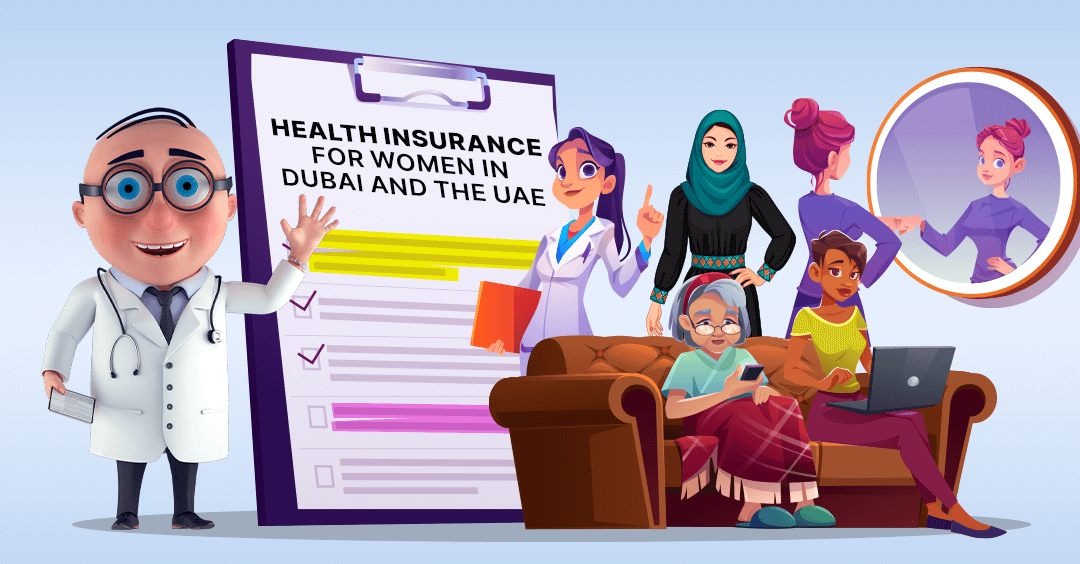The role of the woman has seen a paradigm shift in recent years. No longer just the housewife and mother, women are increasingly also contributing to the household income, and in some cases, are the breadwinner, with successful high-powered careers.
For those juggling motherhood, running a home, and holding down a job, supreme skill in time management is needed and that’s a task that requires both physical and mental effort. Similarly, there are lots of single, independent women running their own homes. This can take its toll on even the fittest of females so it’s vital that she has good health insurance in place. And in the UAE, where cover is compulsory for all, luckily there’s a wide range of providers and policies to choose from.
What Does Health Insurance For Women in Dubai and the UAE Offer?
Whilst many illnesses are common amongst men and women, there are also a number of uniquely female conditions and diseases that most dedicated health insurances take care of. Think female cancers such as those in the breasts, ovaries, and uterus. Osteoporosis and osteoarthritis. Thyroid and other endocrinological or hormonal issues such as menopause. And of course, gynaecological conditions and pregnancy. Health insurance for women focuses on screening for common conditions, “dread diseases” and offers well-women services such as advice on preventative measures, support groups, etc.
Is Health Insurance For Women Different To Men?
In Dubai, and the UAE in general, there are some providers who offer a dedicated health insurance product for women exclusively, but typically, policies can be purchased from any provider under the umbrella of a mainstream product and tailored to suit. There are a few key things to look out for though and these include:
- Maternity insurance: not all polices offer maternity cover so check the terms and conditions carefully. For those that do, you should also check whether the cover is offered for ante-natal, delivery and post-natal and to what level. Another “red flag” area is C-section (surgically assisted delivery) as this can be specifically excluded under some policies and is expensive in the UAE. Note also once you’ve delivered, you’ll need to consider taking out an insurance for your newborn, since babies are not usually included in the mother’s policy.
- Critical Illnesses: serious illnesses or diseases such as female cancers fall into this category of cover so always check the policy for definitions of what is included. Remember that cover under a Health Insurance is limited to relevant treatment only and may have pre-determined limits and conditions so it’s advisable to supplement this cover with a dedicated Critical Illness policy or cover extension under a Life Insurance product for additional financial support and peace of mind.
- Pre-Existing Medical Conditions: always check what cover is available for pre-existing medical conditions. Put simply, any illness, disease or medical issue you had prior to taking out the policy. Some policies may not cover pre-existing conditions or may limit the level of coverage, so it’s important to research this thoroughly if you have an illness for which you receive ongoing treatment or which may require further attention in future.
Does Health Insurance For Women Cost More Than For Men?
Each health insurance is underwritten individually and the age, height, weight, physical condition, and medical history of the person to be insured is assessed. No-one person is the same, however rates will typically be applied as standard for men and women as a starting point. Such rates are based on demographic trends and therefore subject to fluctuation: with male rates higher than female ones on occasion and vice versa. Given the nature of maternity coverage, female policies overall may cost more than those for males since pre and post pregnancy benefits provided are expensive.
Are There Any Other Things To Be Aware Of?
You might also want to consider a policy with a low deductible option. Put simply, a deductible (also known as an excess) is the level of contribution you must pay towards any claim you make and this will be on each and every occasion. If you are planning to get pregnant for example, and are undergoing a variety of tests, check-ups etc, this can mount up so it’s worthwhile checking the deductible limit or finding a policy that has a capped or aggregated deductible limit, meaning you have a fixed “ceiling” for payments of excess amounts for any one claim or policy period.







